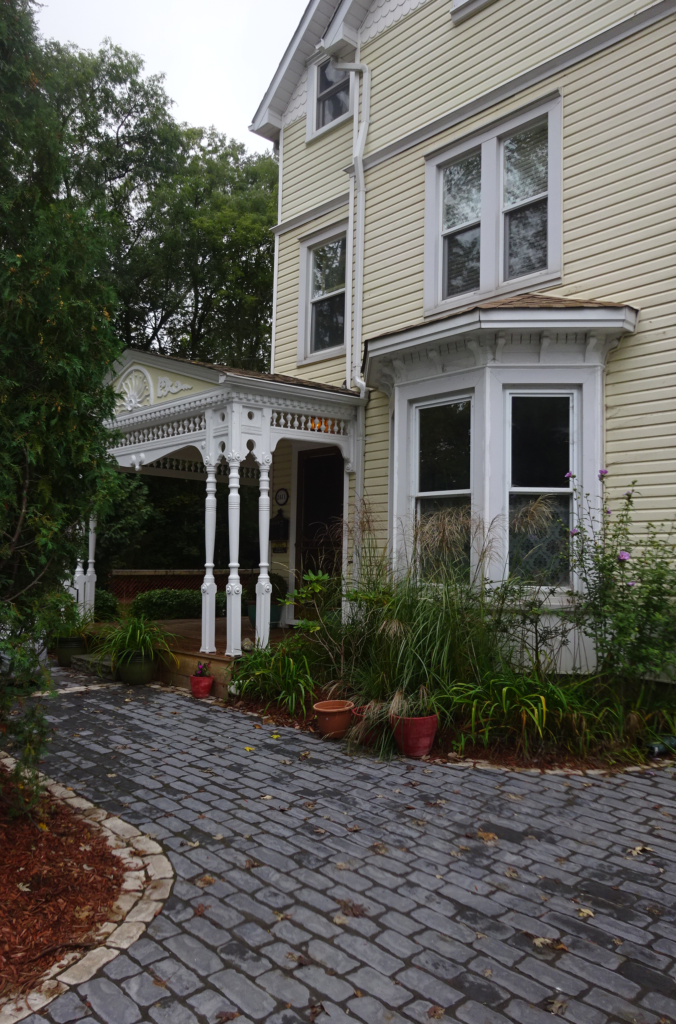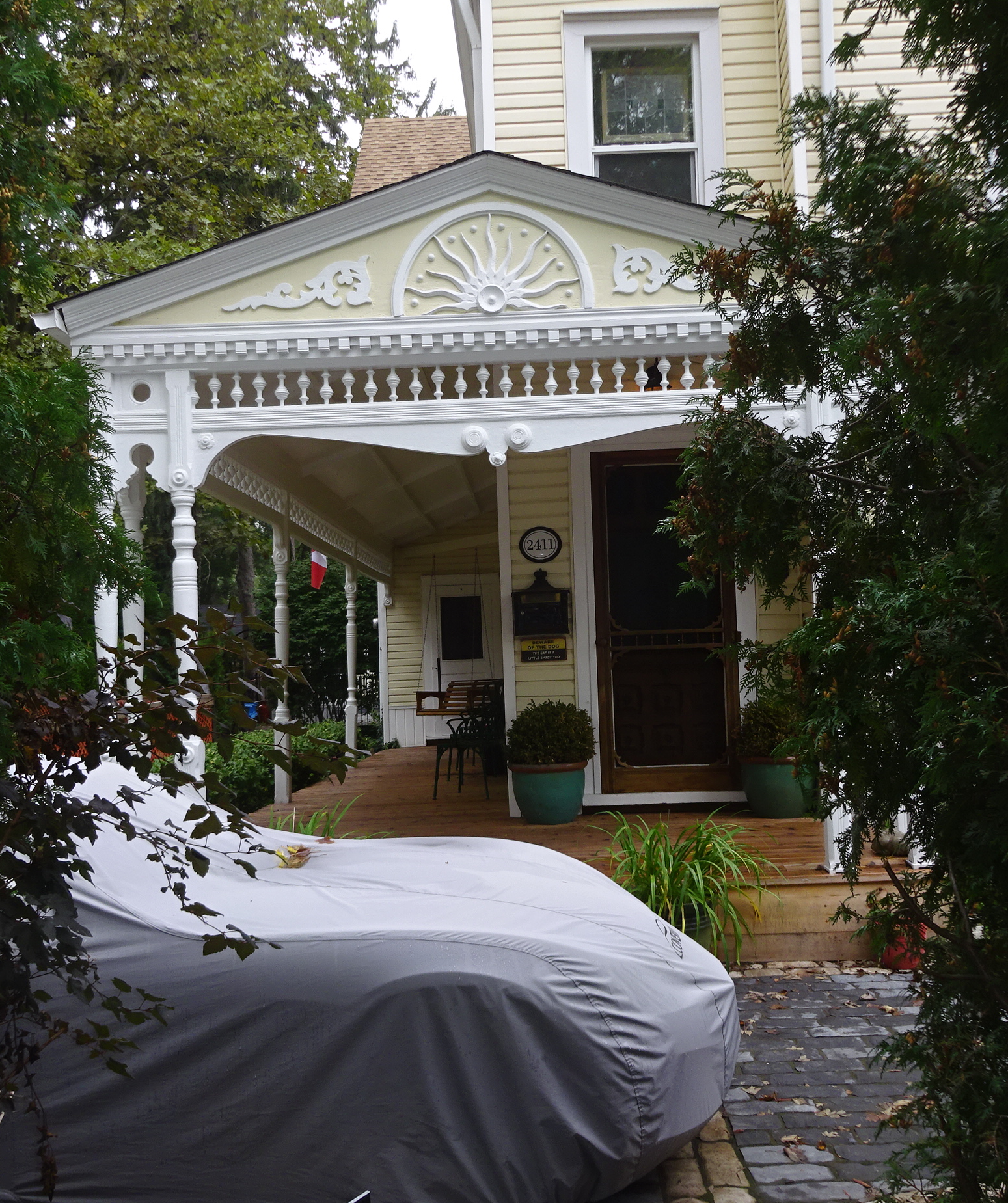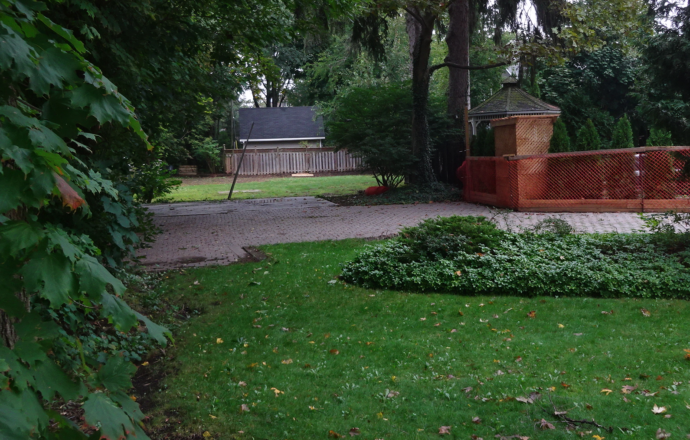 By David Barker
By David Barker
November 4th, 2021
BURLINGTON, ON
Setting the record straight.
Are there problems with the way Heritage Fund grants are awarded? Should members of the Advisory Committee be eligible for the grants?
Notwithstanding the Gazette no longer permits me to post in its comment section to articles it publishes, it has allowed me this opportunity to respond to its article which was ostensibly about grants made available by the City to the owners of Designated Heritage properties, but was very much focused upon me, my designated heritage property, and the three heritage grants I have received over the years from the City’s Community Heritage Fund.
The Gazette‘s article has some inaccuracies and misconceptions. Here I shall try to set the record straight. To do that and provide context it is important to understand a bit about the designating of properties as Heritage, the City’s Community Heritage (grant) Fund, and the role of the Burlington Heritage Committee.

The house is located in a part of the city where there are a number of designated homes.
To qualify for designation under the Ontario Heritage Act a property must have “heritage attributes”. A heritage attribute is defined by the Province as a feature of the property which should be protected and preserved for the future. The Ontario government has set out a detailed process to be followed by municipalities when seeking to place a heritage designation status on a property. A critical part of that process is the requirement for a heritage assessment undertaken by an accredited third party. That assessment, amongst other things will identify any heritage attributes. Assuming the property is worthy of heritage designation, to bestow the designation status on the property the municipality must pass a bylaw which identifies the heritage attributes. The bylaw is placed on the title deed of the property.
The City, in common with many Ontario municipalities, has a heritage property grant program, known as the Community Heritage Fund. Here are some relevant excerpts from the City’s Community Heritage Fund Guidelines document.
OBJECTIVE
To encourage the preservation of buildings with identified cultural heritage value by providing financial assistance for the conservation of these buildings.
ELIGIBILITY
• Properties designated under part IV of the Ontario Heritage Act.
• Any work which conserves or enhances heritage attribute elements specified in by-law.
• Short-term, routine maintenance is not eligible: that includes minor repairs, general painting, repair of non-original siding or roofing or landscaping.

The quality of the restoration work done is superb.
• Conservation of heritage attributes important to the resource’s heritage value is eligible.
• Restoration of heritage attributes where the original from and materials can be clearly determined from documentary evidence.
• Work necessary to restore the building to structural soundness.
o Includes the correction of serious structural faults which threaten the building’s survival, but does not include routine maintenance.
o Structural work necessitated by modern renovation is not included
OK, so the owner of a designated heritage property determines to seek a heritage grant to help mitigate the cost of eligible work required on the property. The property owner files an application, which is reviewed by the City’s heritage planner, who assesses the application, provides a report to the Heritage Committee. The Heritage Committee discusses the application and makes a recommendation, for or against, to City Council. That recommendation is first sent to a standing committee of Council (most if not all members of council are members of the standing committee). The standing committee reviews the entire matter including the recommendations from both the Heritage Committee and from city staff. Should the standing committee determine to approve the grant applied for, the matter is sent to City Council as a consent item. So it’s not as if council members are seeing the item for the first time at the meeting of Council. Those members already saw it at the standing committee stage.
So you will note these grants are not awarded for general improvements to a property, such as building extensions or kitchen renovations, as implied in the article. Grants are awarded so as to mitigate the cost of maintaining or restoring heritage attributes or other non-regular maintenance items that safeguard the heritage property as a whole. Those costs are generally considerably of a higher magnitude than say a house in a modern sub-division.
Now to the specifics of the four items relating to my heritage property referenced in the Gazette’s article.
Please note the Gazette asked me to provide to it for each grant I received:- the date awarded, the amount awarded, and the scope of work that was undertaken. I willingly and in very short order voluntarily provided that information to the Gazette, along with links to the relevant Heritage Committee meeting minutes.

The western part of the property was severed once the Heritage Advisory Committee said it had no objections.
The Gazette is incorrect in its report that I have made application for four (4) heritage grants. I have applied for and received three (3). The fourth item referenced by the Gazette is with regard to my successful application to the City via the Committee of Adjustment to sever my property. Being a heritage designated property any alteration to the building exterior or to the property’s lot lines must be referred to the Heritage Committee for review and its recommendation to Council. I received no funds from the City in this regard. In fact the opposite is true. It cost me $50,000 in fees to the City to gain the severance, not to mention another $100,000 in professional fees
Two (2) of the three (3) grants awarded are in respect of work that was required so as to restore the front porch verandah, which is a heritage attribute cited in the heritage designation bylaw. The total awarded was $1,577.15. The first grant for the replacement of the verandah’s decking boards was awarded September 16, 2020 was not paid to me until May, 2021. Those decking boards are not the usual 1×6 white cedar generally used for decks. They are 2×6 BC red cedar. Way more expensive. The grant awarded September 7th, 2021 has not as yet been paid. Though the work, to repair and repaint the turned columns and decorative sun motif, clearly shown in the photographs in the Gazette’s article, was completed in June 2021.
The first grant awarded was in fact back in 2017, not 2019 as reported by the Gazette. At that time I was not a member of the Heritage Committee. That grant related to the cost of retrofitting weeping tiles and installing a sump pump to combat the rise in Lake Ontario’s water table which was causing ingress of water through the unfinished basement’s floor which jeopardized the building’s foundations.
Readers should note not all work is eligible for grant. For example the $15,000 cost to re shingle the roof in 2019 was not eligible. There is huge inconsistency and illogicality as to what work is eligible. For example the weeping tiles work was eligible because inaction would have imperiled the entire structure. The re shingling work was not eligible even though inaction would also have imperiled the entire structure. Should I have elected to re-roof with shakes the original material used in the 1890s at three times the cost, I would have been eligible for a grant.
The Gazette has correctly reported that in respect of the 2017 and 2021 grant applications I recused myself from participation in the consideration process by the Heritage Committee. And as respects the 2020 grant I was out of the country when the Committee considered the application.
I believe of the eleven resident committee members I (maybe one other) am the only one who actually owns a Designated Heritage property. If being a heritage property owner eligible to apply for heritage grants made one ineligible to serve on the committee, how would the committee be able to get an owner’s perspective of the unique issues owning a designated heritage property brings?
The Gazette states in its article:-
“Where we have an issue is with a member of an Advisory Committee benefiting financially as the result of a decision made by the committee.”
The Gazette is incorrect. The Heritage Committee is an “Advisory” body that has no decision making powers. It makes recommendations to Council. Council then makes the decision.
The Gazette also states:-
“Also, where was Council on this? The Staff report made mention that Barker had been given grants in the past.”
What’s the Gazette’s point here?
Under the terms of the grant program an owner of a designated property is entitled to receive one grant each year but only for eligible restoration or non-regular maintenance works. Receiving three grants during my 28 years of ownership of this designated heritage property does not seem to me like I’m milking the system.


















Sad to see the usual suspects piling on in this case. As a person who has served on a number of voluntary community boards, I can only ask: would you not expect and welcome people with an interest in art to be on an art gallery board? Or people with attachment to gathering artifacts to join a museum board? I could go on. All governments depend on usually unpaid citizen groups to perform such roles, since the alternative is inexpert and uncommitted paid staff. So it’s a win-win, as long as conflict of interest principles are well defined and managed, which seems to be the case here. Searches for absolute purity after the fact by self-appointed nitpickers will only discourage others from sharing their expertise.
It is unfortunate that people, including media reporters, have to stoop to such extremes to “level the playing field” on disagreements and topics of interest that do not agree with their own personal beliefs or agendas.
Pepper & David, while it is clear that “perception is everything”, I am sure governing bodies overseeing groups like the Heritage Committee have protocols in place to allow for members of its own committee to recuse themselves from discussion and voting on issues that may contain conflict of interest. Such as the issue raised here.
While some may believe heritage committees like this one are a waste of resources, they are more important than ever to maintain a balanced playing field within the community to conserve heritage and control exponential progress, growth, and expansion within the community from potential developers, and corporate $$$ agendas.
As you have reported, the dollar values here are very small and the costs for the heritage improvements have already been allocated to the contractors of these projects, so no one is pocketing money here at this level as improvements are shown in real time in the pictures provided.
The only thing I see here is a battle of egos which, as mentioned, are two people trying to level the playing field with insults and bad behavior.
It is noteworthy to include that committees like this one require persons with genuine heritage interest and experience to move the programs forward such as Jim Clemens and others have done. I would expect to see a majority of the committee made up of local Heritage homeowners or preservationists which help run the program fair and square within the boundaries of the committee rules and procedures set out for advisory committees such as this.
So, in conclusion, ask for your checks and balances as any other good reporter would do. However, try not to be the “court of public opinion” until you have all the documented facts and information in your hands, before going after citizens who are trying to maintain our heritage within this city under the rules and grants provided to them, by the City of Burlington.
P.S.
Please rise above this and restore David’s editorials access as that is a his constitutional right under the Canadian charter, for sites like this one, which offer access for comment.
Have a nice day!
Mr. Barker – the issue is not whether it is allowed for you to request a grant while sitting on the Heritage Advisory Committee; it is whether it is appropriate. I personally believe that it is not and that it is important for officials at all levels of a public organization to avoid the perception of conflicted interest. I realize that opinions differ here – yours and those of other readers. It’s a question of where one’s ethical compass points.
So, should the regulations be changed. At present the regulations clearly state there is no conflict of interest so long as the councilor or committee member recuse themselves and take no part in the consideration of the matter.
You know how everyone believes there is a 10kph leeway allowed above the posted speed limit within which tickets are not issued by police to drivers. Are you saying the police when driving in their private capacity should not get the same leeway?
When this article is viewed alongside the first one to which Mr Barker is responding and the other article published today, it would appear the Gazette has a bit of a vendetta going on against Mr Barker.
Mountains and molehills come to mind.
Mr. Smith one’s ethical compass and whether it is appropriate is your view.
Please read the regulations regarding the Heritage Advisory Committee and any other committee that are able to give grants to citizens who meet a certain criteria. You may be amazed that they too, have an ethical compass and find that their regulations are appropriate. These regulations have come about as a result of many discussions, debates and a great deal of hard work by many people to ensure that inappropriate grants or any other financial gain does not occur.
I appreciate Mr Smith you have a personal view, and that’s is all it is, personal not regulatory.
As Paul C says there are protocols in place in order that inappropriate advantages are not obtainable. Not a personal view, a view gained through knowledge.
Ms. Durant:
You do not really understand my point but that is certainly your right. It is indeed my personal view and one which I steadfastly hold. Thee isn’t a great deal to be gained by future debate.
Ms. Hill – yes I would strongly recommend that the regulations be changed. Again, my personal but very strong opinion.
Seems fair enough and above board. Loads of checks and balances in place. So gain a grant to which he was not entitled I guess he would have to influence a majority of the other 10 committee members, the planning staff, and the members of the standing committee. Alot of work for such small dollar amounts.
Well this whole thing explains a lot, in my opinion.
It perhaps explains David’s appearances at city hall and his continual glowing endorsements of staff and council there and here. I don’t care about the hair splitting details. Fact is, he has a personal stake in getting approvals of various things from the City of Burlington/staff/council. He applied for and was granted a spot on this committee, he applied for and was granted permission to sever the lot and sell half of it (I hope whatever is built on that other half fits in with the character of his lovely home but no guarantees. When Councillor Dennison did this he squished a too-big house beside it and in my opinion ruined what was a beautiful property.). You’d want to be on the good side of COB I guess, as he clearly has ensured he is. That’s fine, but thanks for explaining what has long baffled me, LOL.
This reminds me of an old article by Joan Little about the Dennison matter and how she herself chose not to apply for a variance when she was on council because of “appearances”. I realize David isn’t on council; but to me there are similar simple ethical issues. https://www.thespec.com/opinion/columnists/2013/05/09/burlington-councillor-should-spike-variance-application.html
I had no idea taxpayers paid for such expenses. That’s a whole different thing to ponder. I personally wouldn’t ever join a committee and then ask those colleagues to approve paying money to me. And council ends up having to approve their recommendations and staff makes their recommendations on variances and heritage matters so this is where I say oh, this explains a lot.
I might add that spending $150,000 for the severance likely pales in comparison to the many many $150,000s the owner must have got for selling the severed Lakeshore property. And I will certainly add that the email posted in the other article from David to Pepper and his comments there are very disrespectful to say the least. Pepper surely has the right to ban abusive commenters.
Well Mr David Barker has put forward his opinions, also an insight as to the actual process of how grants are awarded. This has enabled me to have a clearer picture of the whole process and how the Gazette may have written some inaccuracies due to the intricate workings of the council as a whole.
Lynn you say “And council ends up having to approve their recommendations and staff makes their recommendations on variances and heritage matters so this is where I say oh, this explains a lot.”
Lynn your sentence implies that the council HAVE to approve. No, they don’t have to approve recommendations, there has to be due diligence, or are you insinuating there is some underhanded goings on?
The article to which you provided a link is interesting.
Here are a couple of quotes from it:-
“It isn’t a conflict technically, but the optics are questionable.”
“…The municipal conflict of interest act, section 4(b) states that a conflict does not exist “by reason of a member being entitled to receive on terms common to other persons any service or commodity or any subsidy, loan or other such benefit offered by the municipality or local board.”…”
“I can’t imagine that he intends to run again in 2014 if he’s alienating an old established (voting) neighbourhood.”
It seems you and the writer of that article you referenced wish for Barker to live by a higher conflict standard than is required. Why is that?
Dennison ran in 2014 and was elected again. Presumably his constituents were not upset and thought he was entitled to apply to sever like any other property owner.
In the Gazette’s article mention is made that a condition of the severance approval is that no building is permitted at the front of the lot. So as to ensure the view from the street of the heritage building is not blocked. That condition was recommended by the Heritage Committee, per its meeting minutes and subsequently the Committee of Adjustment.
Don’t you wonder what was the nature of the harassment Barker refers to that he says he received by email from the publisher? I don’t know Barker but the Publisher must have done something more than suspending his privileges to generate such a reaction.
As said in response to the other Gazette article I question the publishing of dirty laundry, particularly when the other party does not have an equal platform. Distasteful !
. More important in our minds, however, is the seemingly lack of transparency around the very large budget this committee was given some years ago and lack of public accountability to how it has been spent. We deserve this much and if there has been no such accountability we should have it.
Also, the issue we raised in the Gazette comments section, in the past (and Barker denied) the holding of at least one meeting when a quorum was not present where they passed a motion giving themselves expenses. This was raised with Council and Shawna Stolte Chair of the Council Standing Committee the Heritage Advisory Committee reported to, at that time, and was totally ignored.
We will send the editor the info in our files on this so you can determine if the evidence confirms our position “that a motion approved expenses for the Committee members when a quorum of the committee as set out in their Terms of Reference was not present”..
Our media must continue to raise the issues Council has proved they can successfully bury otherwise those sacrifices we honour were in vain.
Executive Summary being sent to Burlington Gazette today which shows Council ignored Councillor Nisan, the Heritage Advisory Committee Council representative ignoring there was no quorum present when Heritage Committee approved a motion to pay expreses for attendance at Workshop. There were heritage motions that were also approved. Further, the minutes were approved when it was clear that the motions should not have been made or approved. The amount of expenses are small but when Councillor Nisan ignores the rules when he is there as a Council representaive and shortly afterwards is appointed Chair of one of the City’s Risk Liability etc. Committee one has to wonder. Accountability is a must and we know of no other media forum in Halton that we can count on to expose what is going on at Council that should not. Pepper is not always right as is the case for all of us, but we have a lot of experience of speaking truth to Council that clearly puts the city at risk and affects tax dollars and is simply ignored because they know beither Councillors and the majority of the media are not going to address the issues. Oh for a Judy Raybould-Wilson on Council!
You are certainly right when you say we all make mistakes.
Her name is actually Jody Wilson-Raybould. I think the appropriate term is LOL.
Apologies but proves our point. We do all make mistakes. But mistakes is not the issue of the Executive Summary it was deliberate setting aside of Council’s own rules that protect the integrity of our committee processes and the very large budget this committee has that was repuedly being overseen by Councillor Nisan.